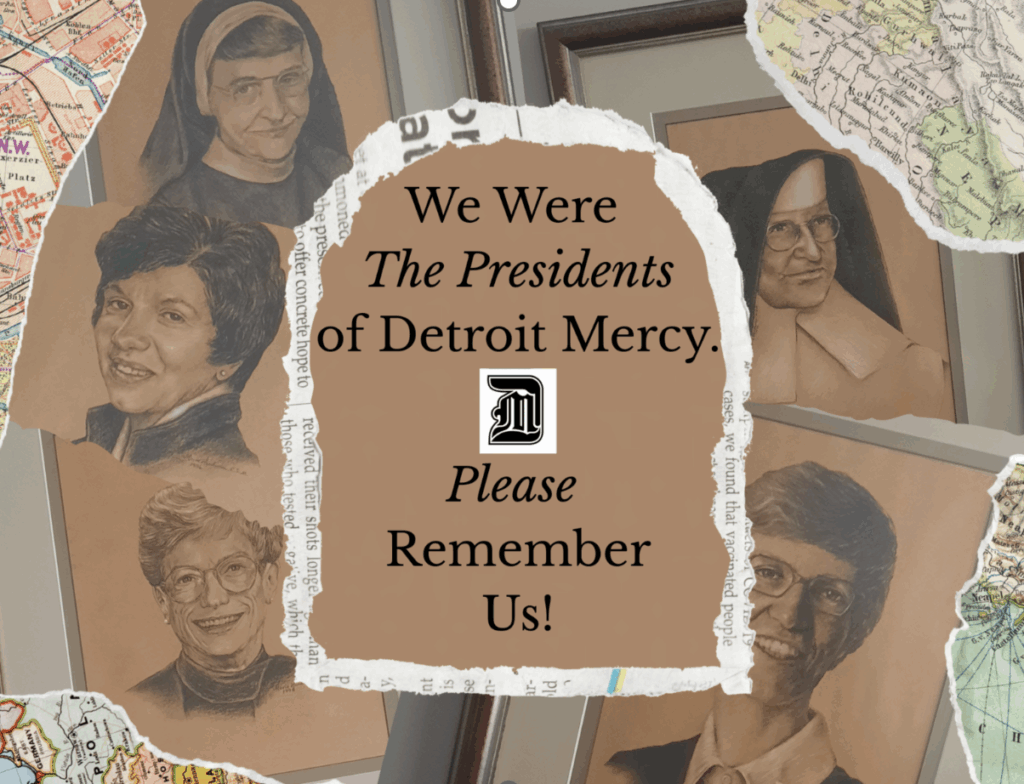
Megan Novell handles several duties on campus, especially after being promoted to the role of an executive director of the Office of Equal Opportunity for the University of Detroit Mercy. However, none of her responsibilities would have prepared her enough for the hot seat of the Titan Taxi: a show that features students riding on a cart to their destination of choice around the school, all the while conversing with a staff member driving them.
Novell wasn’t sure about what questions to ask while behind the wheel – before she consulted a Detroit Mercy timeline made by Cindy Gillham, an associate library professor, who gave her some information she didn’t know about women at the University.
“Women were first admitted to the university in 1915 at the College of Law, followed shortly by the Business School in 1916 … the last one was the College of Engineering in 1942,” Novell said, “That was a bunch of University history I didn’t know.”
Branching beyond the academic nature of these departments are the respective student groups that women made from scratch. Referencing the timeline once more, there are direct mentions of sororities emerging out of these colleges – such as Eta Zeta Sigma made by the commerce and finance sector during December of 1919, the Lambda chapter of Kappa Beta Pi dedicated to law throughout 1920 and Kappa Beta Pi being established on Oct. 8 of 1940 for the pursuit of science.
Ruminating more on these historic departments, Novell also remembered a story that Mary Lou Caspers, a chemistry professor, told her about being the first young woman appointed to a faculty position.
“She said, ‘It’s not like everyone was super hostile and didn’t want me there!’ – that was only an occasional experience,” Novell said. “What was more interesting is that she was 23 years old and taught as the only woman of the college.”
Contemplating about all the information on the impact of women at Detroit Mercy, Novell finally wondered – as many other individuals have on campus – how the school will honor them when the University reaches its 150th anniversary.
After filming an interview with various people from the founding of the Women’s and Gender Studies program more than 10 years ago, Novell declares that there should be more guest speakers present to share their perspectives.
“To have a StoryCorps booth on campus would be awesome, too,” Novell said, “Can we do that?”
Director of Alumni Relations Peggy Pattison may know the answer, as she represents a committee of 28 people who will curate a calendar for the future sesquicentennial at Detroit Mercy. From the former year, Pattison collaborated with a company to print coffee table books that have transcriptions of oral history about life on campus – and these pages will contain not only pictures, but the written stories of 6,000 alumni as well.
“For the anniversary, I’m charging one of my team members during a 10-month period to post these tales on social media twice a month,” Pattison said. “We’re going to poll people’s reactions about that before releasing a video on the full history of Detroit Mercy.”
Besides these records of potential alumni women, Pattison hopes to sponsor a 10-day trip during the spring of 2027 where 45 fortunate contenders can visit Dublin, Ireland – a place that Catherine McAuley, founder of the Sisters of Mercy, called home. On the other hand, Pattison welcomes everyone else – particularly those who are travel shy and would prefer to remain on campus – to use the opportunity of the sesquicentennial for preparing events outside of what ideas her team may have.
“I’m letting departments know that they can brand something during the same time as the anniversary,” Pattison said. “We can teach them the right way to do that, what they can and cannot use the logo with – then, we can put it on our website.”
Regardless of whether women will become a prominent part of the 150th anniversary of Detroit Mercy or not, another associate library professor, Rebecca Tull, believes that such a milestone would be best spent being immersed through the areas where history really happened. Over the course of her seven years on campus, Tull noticed that 80 percent of people from her profession are also women – and someone that stood out to her when she started at the McNichols Library was the former dean of libraries: Jennifer Lynn Dean.
“She played a role in the creation of the multi-faith space down in the Lower Level of the McNichols Library, the mothering room and the Gender Neutral bathrooms,” Tull said. “She was also one of the founders of the Women’s Leadership Roundtable, with Provost Pamela Zarkowski being the first speaker there.”
Considering the feminization that dominates her occupation, Tull continues learning more from the fellow librarians who surround her daily – and fresh faces such as the new university archivist, Mara Powell, and now dean of libraries, Kate Harger, are presumed to follow the same sentiment. Witnessing the way that all these generations of women connect through the communal space of the library, Tull is reminded of the campus legacy nearly every day.
“My family and I went through a Hamilton phase, and leading up to this anniversary, I keep thinking of that one song, ‘Who Lives, Who Dies, Who Tells Your Story’,” Tull said. “There are unsung women who did a lot for the school community, who aren’t always recognized – but whether or not they’re seen will depend on how well their history is being passed on.”
